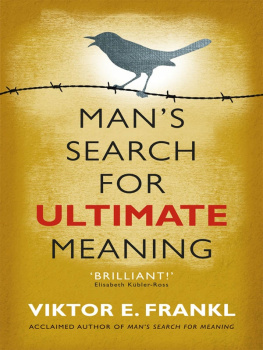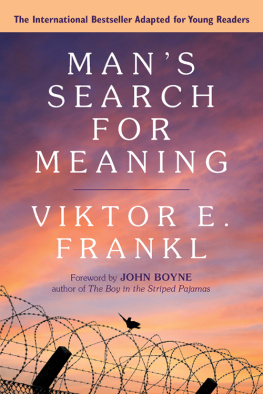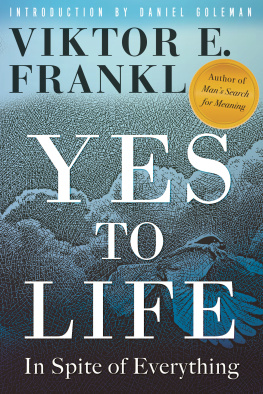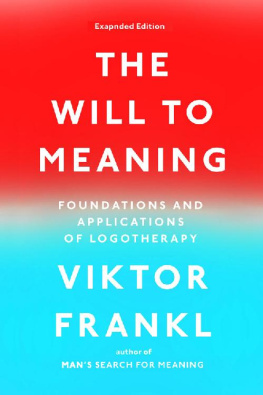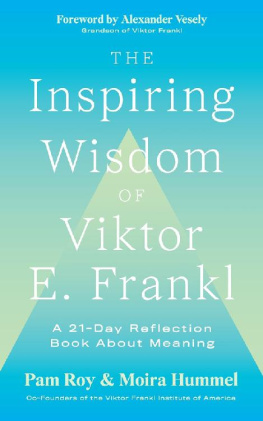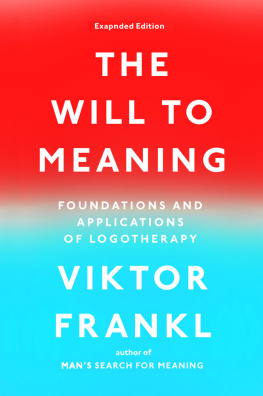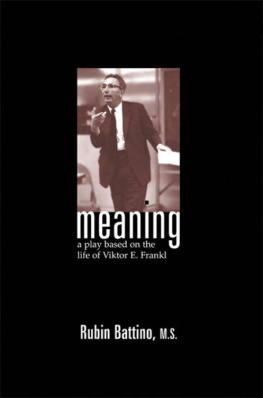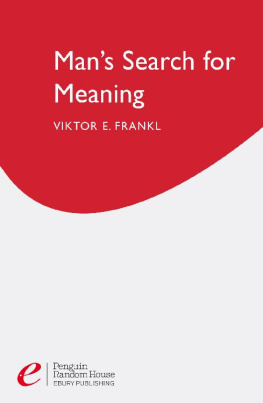Contents
About the Book
Viktor Frankl is known to millions of readers around the world as the author of Mans Search for Meaning, his harrowing Holocaust memoir. In his own words: Readers of my short autobiographical story usually ask for a fuller and more direct explanation... and this insightful book is it. In Mans Search for Ultimate Meaning, Frankl explains the thinking that enabled him to survive the concentration camps in spite of tremendous odds. Believing there is more to our existence than meets the eye, he reveals his firm conviction that we are not glorified animals but repressed angels. From the nature of our dreams to the question of God, Frankl considers a range of important subjects. Ultimately, he reveals how to create meaning for ourselves and how life has more to offer us than we could ever imagine.
About the Author
Viktor Frankl was Professor of Neurology and Psychiatry at the University of Vienna Medical School. For twenty-five years he was head of the Vienna Neurological Policlinic. His Logotherapy/Existential Analysis came to be known as the Third Viennese School of Psychotherapy. He held professorships at Harvard, Stanford, Dallas, and Pittsburgh, and was Distinguished Professor of Logotherapy at the US International University in San Diego, California. His writings have been called the most important contributions in the field of Psychotherapy since the days of Freud, Adler and Jung by Sir Cyril Burt, ex-President of the British Psychological Society.
Born in 1905, Frankl received the degrees of Doctor of Medicine and Doctor of Philosophy from the University of Vienna. During World War II he spent three years at Auschwitz, Dachau and other concentration camps.
Through four decades Dr. Frankl made innumerable lecture tours throughout the world. He received honorary degrees from twenty-nine universities in Europe, the Americas, Africa and Asia. He held numerous awards, among them the Oskar Pfister Award of the American Psychiatric Association and an Honorary Membership of the Austrian Academy of Sciences.
Frankls thirty-nine books appeared in thirty-eight languages. His book Mans Search for Meaning has sold millions of copies around the world. Viktor Frankl died in 1997 in Vienna.
Viktor Frankl is one of the moral heroes of the twentieth century. His insights into human freedom, dignity and the search for meaning are deeply humanising and have the power to transform lives Chief Rabbi Dr Jonathan Sacks
Viktor Frankl declares that evil and ennui cannot fully extinguish us Brian Keenan, author of An Evil Cradling
A LSO BY V IKTOR E. F RANKL
Mans Search for Meaning
The Doctor and the Soul
Psychotherapy and Existentialism
The Will to Meaning
The Unconscious God
The Unheard Cry for Meaning
F OR M ORE I NFORMATION
Institutes of Logotherapy can now be found on all five continents. For further information on Viktor Frankl and Logotherapy, including an extensive bibliography, please refer to the website of the Viktor Frankl Institute, Vienna at www.viktorfrankl.org.
Mans Search for
Ultimate Meaning
Viktor E. Frankl
With a Foreword by Claudia Hammond
and
Afterword by Alexander Batthyny
To my sister
Foreword by Claudia Hammond
As the title suggests, Mans Search for Ultimate Meaning is for anyone who is interested in the hunt for meaning in life. In it, Frankl explains how anyone can find meaning, whatever their circumstances, and why even a life of unbearable pain can still be meaningful. As people begin to wonder whether consumerism is really the way forward, at the start of the twenty-first century this book feels especially relevant.
Im approaching writing this foreword in the way I imagine most people will approach reading the bookas an admirer of Victor Frankls more famous work, Mans Search for Meaning. I still remember sitting in a caf, making cups of tea last long enough for me to finish that book in the same afternoon. If you have not read the original no doubt you will want to by the time you have read this fascinating work.
Mans Search for Meaning, Frankls meditation on suffering and survival, is a classic which has sold more than a million copies for each of the nine days he spent writing it (with sales now in excess of twelve million copies worldwide). We marvel at this concentrated genius, but those nine days only covered the act of writing his thoughts down; the thinking had taken place over many years. Like many great books, it left me wanting more. Some eminent writers leave us to gain all our understanding from the work alone, but with Frankl we are lucky enough to have the set of writings published here, in Mans Search for Ultimate Meaning, in which he explains his thinking in more depth. The following chapters undoubtedly have a unique value if read alone, but also provide a fresh perspective on and a new motivation for reading the first book again.
The second decade of the twenty-first century with its air of crisis and uncertainty is the perfect time to revisit Frankls theories. Reading these writings by Frankl, I am struck many times by the way they anticipate modern research in the field of psychology. Here, he talks of tragic optimism, of how we know that life brings pain, guilt and death and yet, for the most part, we manage to carry on. Using his observations and experiences from the Holocaust, Frankl tells us how to deal with these three inevitable elements of life by making use of them: turn suffering into achievement, use guilt to improve yourself and use the knowledge that life is short as a spur to action. Half a century later optimism has become a key theme in the increasingly influential field of positive psychology, the study of the strengths and virtues that allow both individuals and communities to thrive. Although I doubt Frankl would have described himself as associated with this field, there are some striking parallels.
Anyone with experience of cognitive behavioural therapy (CBT), either as a practitioner or a client, will see precursors of todays techniques in Frankls work. In CBT, people learn how to reframe information, to find other ways of looking at their thoughts. In Mans Search for Ultimate Meaning, Frankl gives the example of an older man devastated by the loss of his wife. The man is questioning why she had to die first, leaving him alone and grief-stricken in old age. Frankl advises him to think of his staying behind as a sacrifice. He has saved his wife from experiencing this grief herself and should view it as a gift to the person he loved most in the world.
In psychological research today resilience is an important theme. Rather than teach children to have high self-esteem regardless of achievement, we should foster the strength of character to handle setbacks in the future as well as successes. Although resilience is not a word Frankl uses often, I would argue that again he was ahead of his time here. In a sense his observations in the concentration camps were studies of resiliencenot just of other peoples, but of his own. Part of the fascination in reading Frankls work is watching how he employs coping mechanisms to manage his own mental survival. He found meaning in his experiences of the Holocaust by taking the opportunity not only to observe human behaviour in a situation far more desperate than any psychologist could create in a laboratory, but also to make use of those insights.

